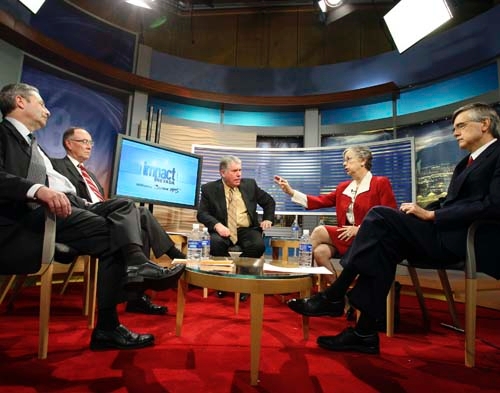Experts: Lawmakers have ‘significant’ gap to close to solve budget crisis
Editor's note: Impact Nevada is a collaboration of the Las Vegas Review-Journal, 8NewsNow and Vegas PBS. It is dedicated to providing information on issues critical to Nevadans. The goal is to give a voice to the public by soliciting their opinions, presenting them to elected officials and holding officials accountable.
There's no quick or easy fix. Or so said four leading economic and tax experts ahead of Monday's release of Gov. Brian Sandoval's budget.
John Restrepo, chairman of the Nevada Economic Forum that determines how much revenue will be available for the state to spend, said Friday that the only silver lining to the fiscal crisis is it's forcing policymakers to examine how government does business.
"A sense of realism has set in," Restrepo said. "We've put away the pompoms."
Restrepo's colleague Michael Alastuey, vice chairman of the forum, agreed that anyone hoping an economic recovery will boost revenues enough to balance the budget without sacrifice is dreaming.
"The gap can't really be closed by any economic recovery," Alastuey said. "The gap to close is significant."
Carole Vilardo, head of the Nevada Taxpayers Association, isn't a fan of new taxes, but even she said it's going to be tough to pay for education and state government without raising or imposing fresh levies -- something Sandoval has pledged not to do.
"Nothing is ever impossible," Vilardo added, however, saying it can be done.
Alan Schlottman, an economics professor at the University of Nevada, Las Vegas, said the problem is the state remains in deep trouble with a record high jobless rate of 14.5 percent in December and continuing home foreclosures. As a result, people don't have as much money to spend, which means sales and property tax collections aren't coming in as before.
"The state may get really slammed" by more foreclosures, Schlottman said.
Despite the doom and gloom, most experts believe Nevada has hit bottom and is ready for the steep climb back -- if businesses regain enough confidence to start hiring again with nearly 200,000 Nevadans looking for jobs.
"The first step to break the cycle is to get people back to work," Vilardo said.
The four experts appeared together to discuss the state budget crisis on the first "Impact Nevada" television program.
The initial broadcast of the Impact Nevada panel discussion aired at 9:30 p.m. Friday on Channel 10, the Vegas PBS station. The program will be rebroadcast today on Channel 10 at 1 a.m., 7:30 a.m., 1:30 p.m. and 7:30 p.m. On Sunday, it will be rebroadcast at 9 a.m. on Channel 8, and on Monday at 7 p.m. on Channel 10.
After the Nevada Legislature starts Feb. 7, "Impact Nevada" will air weekly on Fridays and Saturdays on Channel 10. Future Sunday broadcasts on Channel 8 will be at a regularly scheduled time of 5:30 p.m. Journalists from the Review-Journal, Channel 8 and Vegas PBS will participate in the weekly program.
Late last year, the media collaboration sponsored a statewide public opinion poll on government services and how to pay for them. Results of the poll, and related news reports, are posted on impactnevada.com.
During Friday's Impact Nevada taping, the panel focused on Sandoval's scheduled Monday release of his proposed $5.3 billion, two-year spending plan and his State of the State address to legislators in Carson City.
The current two-year budget is $6.4 billion. So, without raising taxes, Sandoval must find ways to save at least $1.1 billion through a combination of cutting budgets, reducing salaries, trimming services and consolidating agencies.
Sandoval's budget is built on the Nevada Economic Forum's projection of $5.3 billion in expected revenues for fiscal years 2011-13. The five-member forum will meet again May 2 to determine a final projection based on updated tax and fee collections. That figure will launch the end-game budget bargaining between lawmakers and Sandoval.
Forum leaders Restrepo and Alastuey said revenue projections aren't likely to increase much if at all since there are only the beginning signs of recovery and Nevada's visitor-dependent economy may lag in coming back to life.
"There's no instant fix," Restrepo said.
Vilardo predicted legislators, led by Democratic leaders in the Senate and Assembly, would try to pass a tax hike or keep some taxes from expiring in order to preserve more services and fully fund education. Higher education is likely to bear the brunt of any cuts while kindergarten through 12th grade schools might not suffer as much, she predicted.
Professor Schlottman said there's a lot of talk about imposing a new tax on services, while simultaneously decreasing the sales tax of about 6.75 percent on goods, which would give some people a tax cut while broadening the tax base.
The experts suggested public employees would be targeted for cuts because their jobs, salaries and benefits have largely been protected during three years of recession while the private sector has suffered. Teachers, meanwhile, probably will face changes that could result in less union protection for veterans and more accountability in exchange for performance-based merit pay.
"Eighty-four percent of the budget goes to payroll," Alastuey said, noting teacher pay is based on years of service and level of education, which rewards older teachers but not better ones. "Neither of these two by itself is a driver of student achievement."
Contact Laura Myers at lmyers@reviewjournal.com or 702-387-2919.
News, poll results
Impact Nevada: Looking at the State of Our State

















